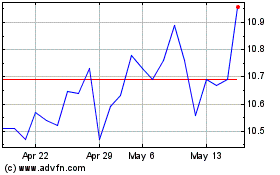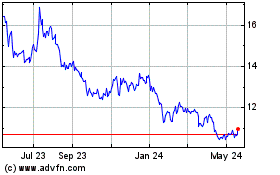By Kathy Chu
HONG KONG -- Luxury watches are losing much of their luster.
Blame a sluggish global economy and changing consumer tastes.
Hong Kong, the top market for Swiss-watch exports, has been
particularly hard hit. Luxury-watch sales have been so slow here
that the makers of Cartier, Tag Heuer and other luxury brands are
buying back possibly thousands of timepieces from dealers, analysts
estimate.
Worldwide, Swiss watch exports dropped 16.1% in June from the
year before. But exports to Hong Kong plummeted 29%, which
retailers say is largely the result of a strong Hong Kong dollar
and the Chinese government's crackdown on gifting.
A few years ago, lines of China mainland tourists eager to take
advantage of Hong Kong's tax-free sales policy formed outside
luxury watch and jewelry shops. Now, high-end watch stores in the
city sit empty for much of the day.
"I don't need another luxury watch," said David Werner, a Hong
Kong resident who owns four luxury watches -- two Dunhills, a
Chopard and a Movado. "The ones I have will last a long time."
Smartwatches are also emerging as another threat to sales of
high-end timepieces.
"This is more practical for me," said Jai Ignacio of Hong Kong,
indicating the Apple smartwatch on his wrist. "I can change the
bracelet to steel links when I need to dress up."
Tellingly, the TAG Heuer unit of LVMH Moët Hennessy Louis
Vuitton SE has launched a smartwatch line.
Retailers say that gaudy designs are generally losing favor to
simpler luxury watches, loosely defined as timepieces costing at
least $3,000 U.S.
"The market right now is very, very quiet," said Alain Lam,
executive director of Oriental Watch Holdings Ltd., one of the
largest luxury watch dealers in Hong Kong. "The more expensive and
the shinier the watch, the slower it moves."
Meanwhile, middle-income consumers "have adjusted downward their
ambitions and buy cheaper watches because they have less money in
their pockets," said Luca Solca, a luxury goods analyst at Exane
BNP Paribas.
Against this backdrop, luxury brands are buying back up to
thousands of watches from dealers to make room for newer -- and
often lower-priced -- high-end models, said Erwan Rambourg, global
co-head of consumer and retail for HSBC.
Watch brands may dismantle the gold and precious metals before
junking watches that are no longer selling, analysts say. Watch
models could also be taken from one market and sold in another part
of the world if there is demand.
"If you don't destroy these old watches, then you have loads of
inventory that won't sell," Rambourg said.
While luxury brands have strict rules over what dealers can do
with unsold merchandise, the fear is that excess inventory could
end up on the black market -- often at steeply discounted
prices.
In the ballroom of a Hong Kong hotel this week, hundreds of
traders haggled over prices for new and old luxury watches
including Rolex, Audemars Piguet and Patek Philippe. Glass cases
displayed thousands of watches and advertised discounts of 32% to
45%.
Watch trader Eric Bossart sold a new steel-and-gold luxury watch
to an Egyptian dealer for $135,000 Hong Kong dollars, a 35%
discount to its retail value.
"The brands don't really want us to offer discounts, but if we
don't, [the watches] don't sell," said Mr. Bossart, who splits his
time between Hong Kong and Switzerland.
Mr. Solca, the Exane BNP Paribas analyst, predicts that more
watch brands will need to take steps to help dealers in Hong Kong
clear high levels of inventory.
In May, the chief executive of Cie. Financière Richemont SA
announced that it would buy back its Cartier brand watches
following a global sales decline of 18% the month before. CEO
Richard Lepeu called it an "exceptional measure" for "exceptional
circumstances."
Since then, Richemont has also agreed to buy back other brands
including Piaget, Montblanc and IWC Schaffhausen, according to some
luxury dealers in Hong Kong, who say this is being done on a
case-by-case basis.
"This kind of buyback offer...hasn't happened in the last 20
years," said Mr. Lam of Oriental Watch.
Richemont declined to comment. Mr. Lam says that LVMH is also
buying back older models of its Tag Heuer, Bulgari and Zenith
watches from Oriental, and giving dealers credit to use for new
models.
A LVMH spokeswoman said the luxury house isn't doing anything
"outside of the brand's normal commercial practices to create room
for new items in the assortment."
In a recent call with analysts, LVMH chief financial officer
Jean-Jacques Guiony acknowledged that the buyback of Tag Heuer
watches has been "pretty painful." But bringing down the price
point will help sales, he said. LVMH posted a 4% sales increase for
its watch and jewelry unit in the first six months of this
year.
Hong Kong watch dealers also say they've talked to luxury houses
from Chopard to Swatch Group -- which owns brands including Omega,
Brequet and Blancpain -- about the possibility of buybacks to clear
the inventory.
Chopard declined to comment. Swatch Group said it has no plans
to buy back watches. "Why should we?" a Swatch Group spokesman
said. "Our products aren't food products that have a date of
expiration."
Waning demand for luxury watches has even affected the
used-watch market in Hong Kong.
Rolexes are largely holding their value, but consumers who pawn
Cartier and Franck Muller watches are getting 20% to 30% less cash
than they did a few years ago, said Edward Chan, chief executive of
Oi Wan Pawnshop Credit Holdings Ltd.
"For luxury watches, we really have to check out the amount we
can sell it for before we offer customers a price these days," said
Mr. Chan. "We expect a further drop in the luxury market."
Kimaya de Silva contributed to this article.
Write to Kathy Chu at kathy.chu@wsj.com
(END) Dow Jones Newswires
August 08, 2016 02:48 ET (06:48 GMT)
Copyright (c) 2016 Dow Jones & Company, Inc.
Swatch (PK) (USOTC:SWGAY)
Historical Stock Chart
From Jan 2025 to Feb 2025

Swatch (PK) (USOTC:SWGAY)
Historical Stock Chart
From Feb 2024 to Feb 2025
